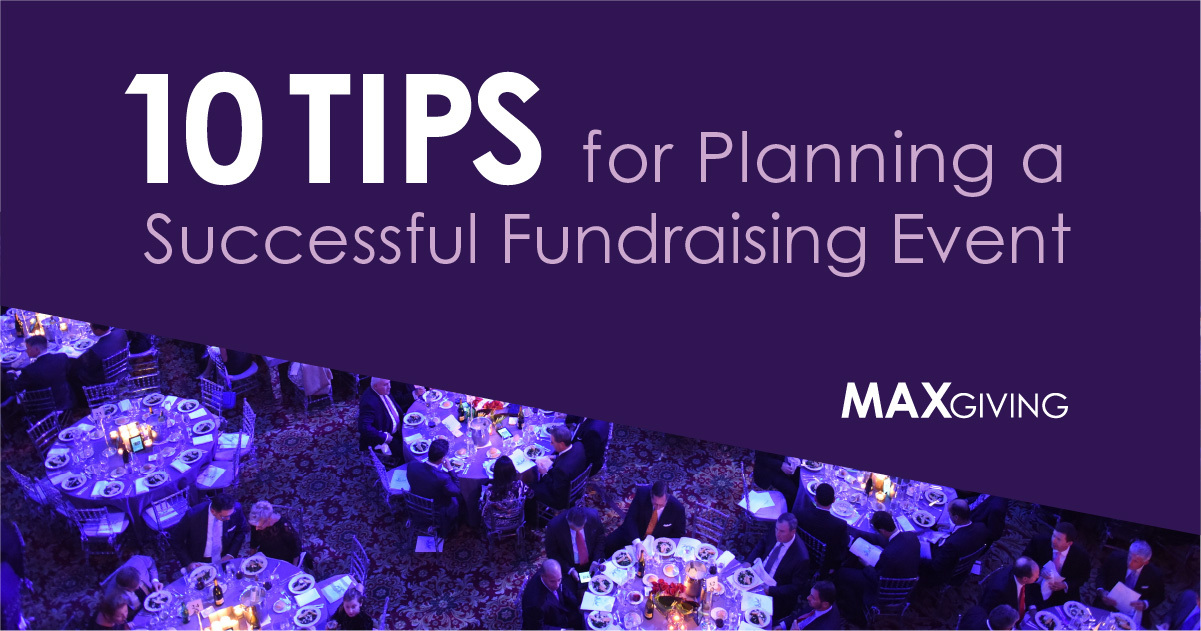Are you in charge of planning a nonprofit fundraising event? Whether it’s a dinner, auction, or golf tournament, successful fundraising requires a lot of forward-thinking and strategic planning. Here are 10 tips to help get you started and ensure that your fundraising event planning goes off without a hitch.
1. Define your fundraising goals and develop a plan
The first step is to develop a fundraising plan and get input from your staff and volunteers. This is the time to start thinking about your target audience and how you’re going to sell tickets or collect donations.
What are you hoping to raise money for? How much do you need to raise? Once you have answers to these questions, you can begin to develop your fundraising strategy. Start by setting a date and venue, and then create a plan to promote the event through social media and other channels. Don’t underestimate the power of LinkedIn to attract potential donors.
With careful planning, your fundraising event is sure to be a success!

2. Know your audience
One of the most important aspects of nonprofit fundraising event planning is to know your audience. Who are you trying to reach with your fundraising event? What type of event will appeal to them? What are their interests? By understanding your target audience, you can more effectively promote your event and raise money for your cause.
For example, if you are raising money for a children’s hospital, you might want to consider a family-friendly event such as a carnival or fair. If you are fundraising for an environmental organization, you might want to hold a green-themed event. And if you are fundraising for a political campaign, you might want to consider organizing a fundraising event that appeals to particular potential donors.
No matter what type of fundraising event you are planning, it is important to keep your audience in mind and tailor the event to their interests. By doing so, you can maximize attendance and fundraising success.
Bonus tip: Use these powerful words to ignite your campaign when reaching out to your target audience.
3. Choose the right fundraising format
When fundraising event planning, it is important to choose the right fundraising format for your needs. There are many different types of fundraising events, from gala dinners to golf tournaments, and each has its own advantages and disadvantages. The key is to choose a fundraising event that will best suit your goals.
For example, if you are looking to raise a large amount of money, you might want to consider a gala dinner or auction. These types of events tend to be more expensive to plan and execute, but they can also be very successful in terms of fundraising. If you are looking for a more low-key event, you might want to consider a bake sale or car wash. These types of events are typically less expensive to plan and execute, but they can still be effective in terms of fundraising — especially if you have a small nonprofit or lower fundraising goals.
No matter what type of fundraising event you choose, it is important to make sure that the event is well-organized and well-executed. By doing so, you can ensure that your fundraising event is successful and that you meet your fundraising goals.
Bonus tip: Are you looking for unique ways to raise money for your nonprofit? If so, consider peer-to-peer fundraising. With peer-to-peer fundraising, individuals can solicit donations from their friends, family, and others in their network on behalf of your organization. Peer-to-peer fundraising can be a great way to engage your supporters and get them more involved in your fundraising efforts.

4. Set a realistic budget
One of the most important aspects of fundraising event planning is to set a realistic budget. This will help you to ensure that your event is affordable and that you do not overspend. When setting a budget, be sure to consider the cost of the venue, food and drink, decorations, entertainment, and any other expenses that might be associated with the event. Once you set a budget, be sure to stick to it as closely as possible to avoid any unexpected costs.
5. Secure sponsorships and donations
Another important aspect of fundraising event planning is to secure sponsorships and donations. This will help to offset the cost of the event and make it more affordable for attendees. When seeking sponsorships and donations, be sure to target businesses and organizations that are likely to be interested in your cause.

6. Promote your event
Once you have planned your fundraising event, it is important to promote it to potential attendees. This can be done through a variety of channels, such as social media, email, flyers, and word of mouth. Be sure to include key information about the event, such as the date, time, location, and cost. You should also include a brief description of the event and its purpose.
If you are able to secure sponsors for your event, be sure to promote their involvement as well. This can help attract more attendees and potential donors. Sponsors can also provide valuable resources that can help make your event stand out.
Early bird registration is a great way to promote your fundraising event. Offer a discount or incentive for those who register early. This will help you increase attendance and reach your fundraising goals.
By promoting your fundraising event, you can help to ensure that potential attendees are aware of the event. Make sure to set up an online donation page with a software like MaxGiving so that people can donate even if they’re unable to attend. A fundraiser page can also communicate important information to your attendees about your event and help you keep track of donations.
Bonus tip: Use LinkedIn to promote your event with these best practices.
7. Create an event timeline
As you begin fundraising event planning, it is important to create an event timeline. This will help you to ensure that all of the necessary tasks are completed in a timely manner and that the event runs smoothly. When creating a fundraising calendar, be sure to allow ample time for promotion, sponsorship and donation solicitation, venue selection, budgeting, and all other aspects of event planning.
One of the most important fundraising event planning tips is to plan well in advance. This will give you ample time to complete all of the necessary tasks and to promote the event. It is also important to note that some fundraising events, such as gala dinners, require a significant amount of planning and preparation. Therefore, it is essential to start fundraising event planning as early as possible.

8. Delegate tasks and appoint leaders
One of the most important tips in fundraising event planning is delegation. This will help to ensure that all tasks are completed in a timely and efficient manner. When delegating tasks, be sure to consider the strengths and weaknesses of each of your staff and volunteers. You should also create a clear system of task completion and responsibility so that everyone is on the same page.
Furthermore, appointing leaders for each task will help to keep the event organized and running smoothly. Leaders should be responsible for overseeing the completion of their assigned tasks and reporting back to the fundraising team.
9. Have a backup plan
No matter how well you plan, there is always the possibility that something could go wrong. That is why it is important to have a backup plan for your fundraising event. This could include having a backup venue, alternate forms of fundraising, or additional volunteers on standby. By having a contingency plan, you can help to ensure that your fundraising event is successful even if something unexpected happens.
10. Determine how you will sell tickets
One of the final aspects of fundraising event planning is to determine how you will sell tickets to your event. There are a variety of ways to do this, such as online, through a ticketing service, or in person. Be sure to consider the most convenient and affordable option for your attendees. You should also set a price for tickets that will cover the cost of the event while still being affordable for potential attendees.
This is where event planning software like MaxGiving comes in handy. It can help you streamline ticket sales, connect with donors, check guests in, and plan an incredible event — without the hassle and headache of figuring it out by yourself. An all-in-one platform like MaxGiving helps streamline all those processes and more by having everything — especially donor data — consolidated in the same database.
By following these tips, you can get your nonprofit fundraising event started on the road to success. Taking the time to plan and prepare pays off in the end and enlisting the help of an effective software fundraising like MaxGiving will allow you to enjoy your fundraising event and keep your eyes on the big picture.


